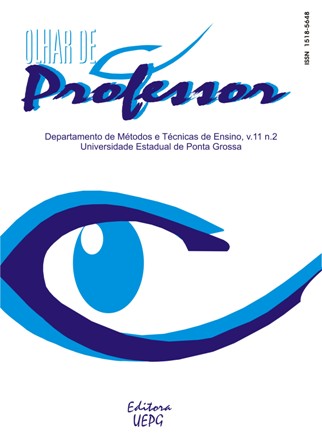A AUTO-AVALIAÇÃO DE ESCOLA: UM ESTUDO EXPLORATÓRIO SOBRE OS DISPOSITIVOS DE AUTO-AVALIAÇÃO DAS ESCOLAS PÚBLICAS EM PORTUGAL(THE SCHOOL SELF-EVALUATION: AN EXPLORATORY STUDY ON PUBLIC SCHOOL SELF-EVALUATION PROCESS IN...Doi:10.5212/OlharProfr.v.11i2.355382
Main Article Content
Abstract
A avaliação de escola tem vindo a ganhar força com a preocupação inerente à crescente autonomia da escola que a obriga, por um lado, a prestar contas à sociedade e, por outro, a desenvolver aprendizagens que proporcionem as soluções adequadas e criativas à resolução dos problemas que lhe são constantemente colocados. Sendo a avaliação encarada, pela maioria dos responsáveis políticos, como uma estratégia de melhoria da escola, justifica-se que esteja a ser objecto de uma profunda reflexão no seio do Sistema Educativo Português. É, neste contexto, que sustentamos que a avaliação de escola, sobretudo na modalidade de auto-avaliação, é um meio de aprendizagem organizativa, capaz de habilitar uma comunidade educativa a organizar os seus processos de melhoria e a mobilizar o conhecimento interno da escola necessário para responder, de modo adequado e criativo, às mudanças. Assim, durante o ano de 2007, levámos a cabo uma investigação, cuja preocupação central assentou, fundamentalmente, no conhecimento dos dispositivos que têm sido desenvolvidos nas 769 escolas públicas do 2.º e 3.º ciclos dos ensinos básico e secundário. Para tal, elaborámos um questionário que, depois de validado, enviámos a todas as escolas, em versão electrónica, possibilitando a resposta por essa mesma via. Os dados obtidos, a partir das 274 respostas, foram tratados com recurso ao programa informático SPSS (versão 13.0 para Windows) e, posteriormente, analisados. Neste artigo, apresentaremos alguns resultados que nos ajudaram a compreender e a problematizar as práticas de auto-avaliação das escolas públicas.
Palavras-chave: Auto-avaliação de Escola. Dispositivosde Avaliação. Organização Aprendente.
The evaluation of school has gained visibility due to its autonomy inner concerning which puts it in a position of, by one side, establishing a dialogue with society, and by the other, developing a creative learning that provides the most appropriate solutions to solve the demanded problems. Evaluation is considered, by most politicians, as a strategy that can make the school to improve, which justifies it to be the subject of a further consideration within the Portuguese Educational System. In this context we consider the school evaluating system, in its self-evaluation approach, an organization learning way, which can enable the educational community to manage its improvement processes and sensibly the necessary school’s internal knowledge in order to answer the changes. Thus, throughout the 2007 year, we carried out a research, whose essential concern is the awareness of the devices developed into the 769 basic and secondary public schools of Basic and Fundamental Schooling. So, we drew up a questionnaire and sent it to all schools in a electronic version, enabling electronic replies. The obtained data from the 274 responses were processed using the SPSS software (version 13.0 for Windows), and subsequently analyzed. In this article we present some results that helped us to understand and enquiry the practices of self-evaluation in public schools.
Keywords: School self-evaluation. Evaluation Devices. Learning organization.
Downloads
Article Details
Authors who publish in this journal agree with the following terms:
a) Authors keep the copyrights and concede the right of its first publication to the magazine. The work piece must be simultaneously licensed on the Creative Commons Attribution License which allows the paper sharing, and preserves both the author identity and the right of first publication to this magazine.
b) Authors are authorized to assume additional contracts separately, to not-exclusively distribution of the paper version published in this magazine (e.g.: publish in institutional repository or as a book chapter), with the author identity recognition and its first publication in this magazine.
c) Authors are permitted and stimulated to publish and distribute their papers online (e.g.: in institutional repository or on their personal webpage), considering it can generate productive alterations, as well as increase the impact and the quotations of the published paper.
d) This journal provides public access to all its content, as this allows a greater visibility and reach of published articles and reviews. For more information on this approach, visit the Public Knowledge Project, a project that developed this system to improve the academic and public quality of the research, distributing OJS as well as other software to support the publication system of public access to academic sources.
e) The names and e-mail addresses on this site will be used exclusively for the purposes of the journal and are not available for other purposes.

This work is licensed under a Creative Commons Attribution 4.0 International License.





